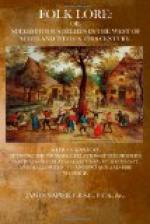I am aware that the Romans appointed the first of January as the first day of the year as early as B.C. 600, and dedicated it to the goddess Stranoe. This, however, could not affect the inhabitants of Britain, at least not until the Roman invasion, and this influence did not reach our northern counties. There can be little doubt, I think, that the great festival of the Romans, the Saturnalia, held in honour of Saturn, the father of the gods, and which lasting seven days, including the winter solstice, was introduced into this country, and in course of time became identified with the Druidical festival of the natives. Other elements conspired to modify the ancient druidical festival. After the Romans withdrew their armies from the island at the commencement of the fifth century, other invaders took their place. Saxons, Jutes, Angles, and Normans occupied large tracts of the country; but as these were mostly all sun-worshippers, their festivals and ceremonies would, for the most part, coincide with the native usages, and whatever peculiarities they might bring with them in the matter of formulas, would take root in the localities where they were settled, and eventually the indigenous and introduced formulas would coalesce. Another element which materially influenced and, vice versa, was materially influenced by Pagan formulae, was Christianity. Introduced into Rome at a very early period, it was for a long time opposed as subversive of the established religion of the empire. Now, during the festival of the Saturnalia, the Romans decorated their houses, both inside and out, with evergreens, the Christian converts refraining from this were easily discovered and set upon by the people, were brought before the judges and condemned, in many cases, to death, for their infidelity to the national gods. But as a result of this severity the Christians learned to be politic, and during the Saturnalia, hung evergreens round their houses, while they kept festival within doors in commemoration of the birth of Christ. This Christian festival, with its heathen attachments, soon spread throughout the Roman empire, and thus became introduced into Britain also. It appears however, that the day on which this feast was kept differed in different localities, until towards the middle of the fourth century Julius I., Bishop of Rome, appointed the 25th December as the festival day for the whole Church, an edict which was universally obeyed. As was to be expected, many of the ceremonies and superstitious beliefs emanating from the Saturnalia were merged in the customs of the Christian feast, and do still survive in modified forms till the present day. In many of our Christmas customs we can thus perceive the influence of the self-preservation policy of the early Roman Christians, and in the survival of many other pagan customs in this and other of our festivals, we can trace the influence of another policy, the worldly-wise policy of the Roman Church.




